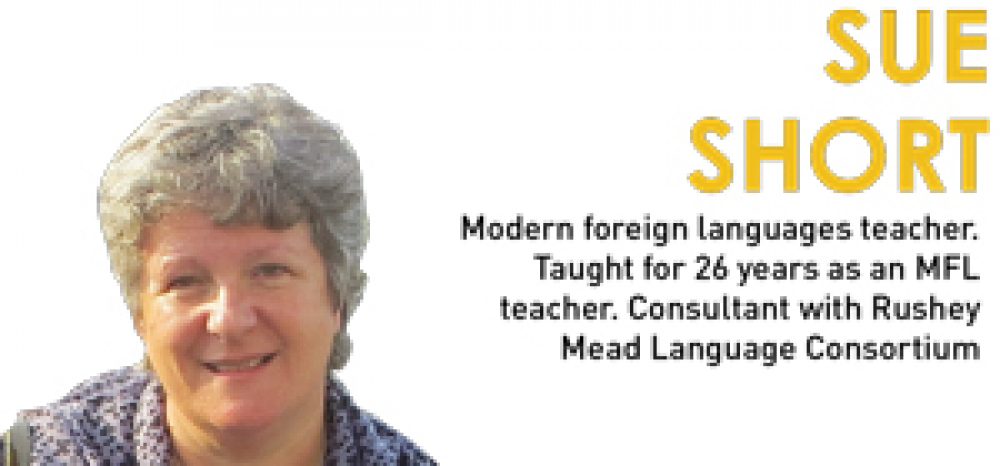Unlike in many other subjects, the new modern foreign languages GCSE is retaining a listening and speaking component. This will keep students interested and help develop these crucial language skills
Ofqual says that the ability to speak the language is a key aspect of a modern foreign language GCSE. No one could argue with that – now.
Back in the 1930s my mother was told by her girls’ grammar school French teacher that they wouldn’t be doing any oral work because it made the girls speak in a silly way. In contrast, by the 1970s I spent many a happy French lesson acting out plays we had invented from a rich input of exciting language (including helicopters and poisonous mushrooms), complete with authentic exclamations and marvellously exaggerated intonation, plus liberal use of the phrase “Suivez-moi au poste de police!“
Our speaking imitated our listening (to a tape recorder and the teacher) and was spontaneous but rehearsed. I strongly suspect that had I continued to learn in this way I would have done better in my
O and A-level oral exams. Instead the focus switched to the written word and top grades for translation and composition.
Until I spent a year in France when I was 21, I didn’t really begin to develop the listening and speaking skills required “to communicate and interact effectively and confidently” let alone to “make creative and more complex use of the language … to express and justify [my] own thoughts and points of view” – that is, some of the skills the new GCSE proposes to assess (and what good teachers always make central).
A fantastic opportunity to develop spontaneous speech that has been (or will be) built up from age seven
The new GCSE replaces teacher-marked “controlled assessments” with more tightly controlled “speaking tasks” to be externally assessed by the exam board. Ofqual reported earlier this year that most modern foreign language (MFL) teachers welcomed the demise of controlled assessment as they found it reduced teaching time, narrowed learning, tested memory rather than language, and resulted in students being less well prepared for A-level studies.
This is the latest in a long line of ever-changing approaches to examining oral proficiency. From the stranger-examiner with notebook-and-pencil in a corner of the school library, through the technological advances of cassette recorders and dodgy microphones, to digital voice recorders and sound files.
Still, whether the assessment is conducted by a familiar teacher or external examiner; whether the recording is wrapped in a Jiffy bag or assessed “live”, there are some clear principles which should be taken into consideration.
Over-preparing long lists of “answers” to set questions kills the real language skills needed to initiate and develop a conversation and deal with the unexpected. There is a difference between memorising large chunks and building up a repertoire of useful language through rehearsing its use in a meaningful context.
GCSE specifications will be cumulative and progressive in content and language, and will take account prior learning in key stages 2 and 3. What a fantastic opportunity to develop all that spontaneous speech that has been (or will be) built up from age seven (MFL is compulsory for key stage 2 students from September this year).
We must take seriously younger children’s generic language learning strategies, encouraging secondary school students to take a proactive role in conversation, to use “repair strategies” and interact without a script.
The role of the teacher-examiner is crucial and requires investment in time and money, preparation and training. Unlike other performance assessments such as the driving test or a ballet exam, the MFL student’s speaking performance centres on interaction with the person conducting the test, and that conduct must be consistent and fair.
There’s also the potential of video technology. In real life we use paralinguistic clues (facial expression, gesture) to aid understanding; filming the speaking tasks would enable the exam boards to see whether (or not) a student is reading from notes.
Whatever the new GCSE specifications bring, let’s hope that they promote real listening and speaking skills in contexts that interest the students.
Sue Short is a modern foreign languages teacher, and is currently a Consultant with Rushey Mead Language Consortium







It’s high time that spoken and listening skills were included as a key component of language courses. As is mentioned in this article, reading and writing skills do not necessarily lead to spoken skills, and after all why do most people learn languages. I would suspect to be able to speak it!
Speaking and listening I would contend need to be the drivers for language learning (as is the case in learning the mother tongue) Once you learn the to speak, reading and writing can be used to support that and extend on it. The speaking I am talking about is not drilling or parroting but creatively making language, albeit in a controlled manner at the lower levels. That way our language learning ability can improve at the same time.
For this to happen, there will need to be a lot of teacher development, as currently this mostly does not happen. Here are some ideas as to what elements of language learning need to be accentuated side by side: http://www.strategiesinlanguagelearning.com/best-language-learning/